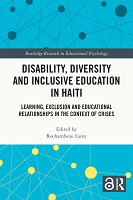Chapter 3 Representation of children with disabilities and cognitive justice in Haiti
Proposal review
Abstract
It is a well-known fact that the Haitian education system is marked by school segregation as a corollary of social segregation (Joint, 2008; Tardieu 2017; Abraham, 2019). This system of educational apartheid maintains the structural exclusion of disadvantaged and vulnerable children from quality education. In other words, it maintains the learning gap between children from urban and rural areas; between learners from upscale neighborhoods and those from slums; between those of 'well-educated' parents and those of uneducated and impoverished parents. But what about children with disabilities? What kind of reception or educational relationship is provided in the education system for children with physical disabilities or learning disabilities?
The results of this research mainly revolve around four key notions, namely: social representations, the social model of disability, pedagogical relations and cognitive justice. They highlight the weight of the social representations of people with disabilities on the forms of educational relationships built and practiced at school. While expectations are high in terms of human resources and adapted teaching materials, this study reveals that all public education policies guided by the principles of inclusion and cognitive justice must act upstream on the underlying thought patterns. These constitute deep obstacles to the intellectual and social emancipation of children with disabilities.
Keywords
Context, Crises, Disability, Diversity, Education, Educational, Exclusion, Haiti, Inclusive, Lainy, Rochambeau, Learning, RelationshipsDOI
10.4324/b23239-6ISBN
9781032389462, 9781032389479, 9781003347644Publisher
Taylor & FrancisPublisher website
https://taylorandfrancis.com/Publication date and place
2023Imprint
RoutledgeClassification
Education
Educational psychology
Educational strategies and policy: inclusion


 Download
Download